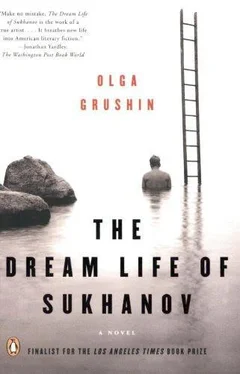“That’s all right,” Sukhanov said, rising. “I only wanted to say hello, I was passing—”
The bell rang in the hallway.
“Oh,” she said, and glanced at him anxiously. “Oh, that must be my guest.”
“Don’t worry, I’m leaving already,” he said. The bell rang again. She seemed about to wring her hands. “Well, aren’t you going to let them in?” He attempted to smile. “Go on, I’ll stay a moment.”
When her shuffling steps had retreated into the dimness, he walked to the window and wrestled with the windowpane, still bound with last winter’s insulating tape. Finally throwing it open, he breathed in the air of the August evening, as deeply aromatic as the evenings of his childhood, redolent of linden trees, meat pies, and tiptoeing coolness. Then, hearing hushed voices in the hallway behind his back, he lifted the birdcage in his arms—it was heavier than he had expected—and after sliding the bar on its door, held it out the window and shook it. The canary tumbled out and sank onto the windowsill, staring at him with a puzzled black eye. “Off, off you go, you evil minion!” Sukhanov whispered, slamming the window shut, then hurriedly placed the empty cage back in its corner, turned around with an absent look on his face—and was just in time to see Fyodor Mikhailovich Dalevich enter the kitchen.
“Tolya,” Dalevich said softly. “Hello. Aunt Nadya told me you were here.”
His expression was as mild as ever. He wore Dalí’s suit and Magritte’s hat, and held a boxed cake in one hand—Sukhanov could read the name “Ptich‘e Moloko” on the lid—and a thin folder in the other. Nadezhda Sergeevna followed a frantic step behind.
“Well, well,” Sukhanov said after a lengthy pause, filled with barely articulated, violent thoughts. “I must say, you do look marvelously convincing—just like a real person. ‘Aunt Nadya’ was a charming touch too.”
Dalevich looked at him sadly. “I understand you are still angry with me,” he said, “but I hope this meeting will give me another chance to explain. Please, Tolya, I’ve already told your mother everything, and she believes me. Let me just—”
“Oh, I doubt very much you’ve told her everything. I bet you’ve failed to enlighten her on the subject of Dalí.”
“I’m sorry about your article, I really am,” Dalevich protested meekly. “The whole thing was an accident, I never intended to interfere with your job. In fact, now that I’ve finished my research here, I’m returning to Vologda, my leave has ended anyway—”
“You know damn well I’m not talking about some article!” Sukhanov hissed, slapping his hand against the table. “And you can’t even lie convincingly—it only occurred to you to say Vologda because of that idiotic folksong they were broadcasting on television just now!”
A seemingly confused look appeared on Dalevich’s face. He played his role well.
“Aunt Nadya,” he said haltingly, “I think I’d better be going, I don’t want to upset anyone…. Here, I’ll just put the cake on the table. And these, Tolya, I was going to leave them with Aunt Nadya, they are for you, I’ve meant for a long time to—”
Holding out the folder, he started to edge into the corridor.
In a high-pitched voice that did not belong to him, Sukhanov shouted, “Oh no you don‘t, you surrealist bastard!” and, his glasses sliding sideways, the whole room tilting, rushed wildly at the doorway.
He had imagined Dalevich ripping at the impact like a taut canvas, but the shoulders he gripped and shook had the solidity of an ordinary body. Dalevich, his eyes round with fake astonishment, weakly lifted his hands to his face, dropping the folder he had been clutching—and immediately a flock of pastel-colored pages burst out of their cardboard confinement and fluttered onto the floor.
The movement was so unexpected that Sukhanov glanced down mechanically and saw, landing on his foot, a pale watercolor of a birch tree whose leaves were transforming into translucent green butterflies and taking off on their first, quivering flight. The lines were clumsy, and the colors childish; but as he looked at it, a feeling of recognition trembled in his heart, and slowly releasing Dalevich, he bent to pick up the page, bringing it close to his face, doubting his sight, doubting it could be possible….
And yet it was—one of his own first works, drawn under the tutelage of Oleg Romanov, when he had been only a thirteen-year-old boy, and subsequently lost in the whirlwind of the war. Incredulously, he turned around the kitchen, while his mother and Dalevich watched him with nervous expectation. There, under the table, rested an ink sketch he had done of their Inza street awash with melting snows, and a quick study of a weeping woman with a coarse peasant face holding a winged child in her arms; here, by the sink, lay a bleak landscape of a winter field crisscrossed by wires dotted with ruffled sparrows (which, he remembered with a start, spelled out with secret irreverence, each bird a tiny note on its wire, a musical line from a popular song about the Motherland), and next to it, a portrait of his teacher Romanov, his small figure drawn in black-and-white, the world around him blossoming into lush colors from the touch of a raised brush. He leaned to see better—and then, beneath the window, he glimpsed a drawing of a tall man in a coat, standing in a doorway with a brilliant smile on his face—that waking dream he had had so often as a boy….
“How?” he said hoarsely. “How did you get these?”
“But you gave them to him yourself, don’t you remember, Tolya?” said his mother hastily. “Oh, how I wish you two would stop fighting! You boys got along so well that time we stayed with Irochka Dalevich, after the… after we came back to Moscow in ‘forty-three.”
“Who on earth is Irochka Dalevich?”
“Irochka Dalevich, my second cousin—Fedya’s mother! Surely you remember?”
“Mama told me not to bother you,” Dalevich added readily, “but I was so fascinated by you I followed you around constantly, until you made me a present of your drawings—to get rid of me, I suspect. I was only ten at the time, but I clearly remember thinking I’d never seen anything more beautiful in my life. As a matter of fact, it’s entirely to you, to these drawings of yours, that I owe my interest in art. I know you didn’t pursue it as a career, but all the same, you had a real gift, Tolya, to be able to change people’s lives like that—”
He continued to talk in the same soothing voice; and as Sukhanov stared at the moving lips half concealed by the blond beard, he became aware of a memory that had stirred in the recesses of his being at his mother’s words and was now gathering momentum, until in a hazy sequence there began to pass before him the dismal wallpaper, the bathtub on clawed feet, the low ceilings looming over him through nightmare-ridden sleep, the skinny, sharp-nosed little woman placing a miserable succession of barely warm suppers on the table, and present through it all, a quiet yellow-haired boy, a few years younger than he, watching him, always watching him, with curious, guarded eyes….
He looked again at the pages scattered on the kitchen floor—the first real evidence, delivered after a quarter of a century, that he had not dreamt it all, that he had, indeed, led a different life once—and then everything ceased to matter, everything but these drawings of a child, rescued so miraculously from the vortex of time and deposited so neatly at his feet. So perhaps Dalevich was no malevolent avenger but merely a bumbling, well-meaning relative from the misty Russian North; perhaps he himself, and no one else, was to blame for the loss of his position, his family, his sense of self; perhaps all the destruction in his life was, in fact, the inevitable, logical conclusion to the choices he had made all those years before…. Yet startling as these potential revelations would have seemed only an hour earlier, they were of little interest to him now. Unaware of the tense silence in the kitchen, he gathered the pages off the floor and methodically smoothed them out on the table, peering at each one closely, with eyes dimmed by decades of skimming over slick productions of socialist realism. No longer used to the sight of his own lines, his own colors, he felt suddenly anxious to test each work for timid traces of uniqueness, for an early testimony of talent—at times lifting this or that drawing against the light as if expecting to see some sign emerging through the watercolors like a transparent watermark, at times following a meandering outline with a finger—and wondering, wondering with a new, surprising sense of near-discovery, whether he could have been wrong that December night so long ago—whether paintings continued to lead their own secret, joyous, eternal lives after all, in the hidden crevices of people’s memories, in the deepest drawers of people’s houses, in the shadows of museum basements—and whether it was possible that once upon a time he had really had a gift…. And then an urgent need to confirm some truth he had just begun to suspect was upon him.
Читать дальше








![Theresa Cheung - The Dream Dictionary from A to Z [Revised edition] - The Ultimate A–Z to Interpret the Secrets of Your Dreams](/books/692092/theresa-cheung-the-dream-dictionary-from-a-to-z-r-thumb.webp)



